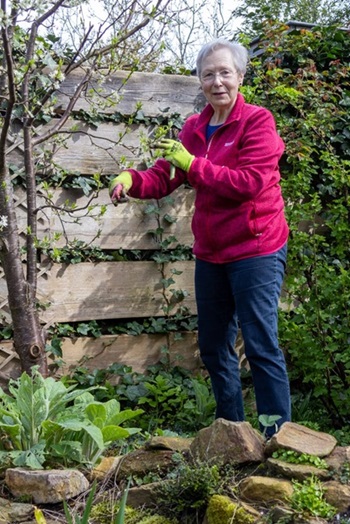
Written by: Paula Arellano Geoffroy
Published: 16-05-2024
Wikipedia defines a special interest group (SIG) as ‘a community within a larger organization with a shared interest in advancing a specific area of knowledge, learning or technology where members cooperate to effect or to produce solutions within their particular field, and may communicate, meet, and organize conferences’.
SENSE has nine SIGs that organize talks a few times a year in person or online, and whose meetings are open to Society members and non-members (guests) alike. All SIG meetings are announced well in advance on our SENSE calendar. This week, I invite you to meet UniSIG and its convener, Joy Burrough-Boenisch (on the right, inspecting her damson tree), a SENSE founding member and an honorary member of our Society.
Your encounter with Jackie Senior in the Netherlands in 1989 prompted the creation of SENSE. Can you tell us about your background and a bit about that fortunate encounter?
I arrived in the Netherlands in 1976, as ‘wife of’ a scientist. I had met him in Oxford, and we continued to exchange letters after he went to Sabah (Malaysian Borneo) to map soil and I went to Canada to do an MA in Tropical Geography. During the UK postal strike from January to March 1971, when I was writing up my thesis on Guyanese peasant agriculture in the bitterly cold Montreal winter, our correspondence thrived. In spring he wrote, asking me to marry him. He was even prepared to pay my air fare! So I flew to meet him in Kuala Lumpur, we went on to Sabah and were married there in June. While living in Sabah, I did some research, published articles on ethnography and on periodic markets (a booklet), co-edited The Sabah Society Journal and edited reports written by Malaysian agricultural scientists. After we moved on to Sydney, this experience helped me get a job as an Editorial Officer at the New South Wales Department of Agriculture, where I learnt to compile and copy-edit informational leaflets for farmers. After our first son was born, I took on freelance editing work for several academic publishers in Sydney. But we decided to move back to Europe, to a more fulfilling academic environment and to be nearer to our parents. The Netherlands was intended to be a stepping stone to Britain: my husband initially landed a one-year visiting-scientist post, then became a lecturer in Wageningen, and soon after a professor at Utrecht University. With very little childcare available and my second son on the way, I continued as a freelance editor and found it easy to get work editing papers by scientists from Wageningen’s research institutes and Landbouwhogeschool. I joined the European Association of Science Editors (EASE), and it was my 1989 letter about Dunglish published in the EASE journal that prompted Jackie Senior to write to me, as she’s explained elsewhere on the SENSE Blog.
Do you recall being part of SENSE SIGs back then?
When SENSE was launched in 1990 our options for contacting colleagues were to use a phone tethered to the wall to call a similar device in a building elsewhere, to transmit a written document via a facsimile machine (‘fax’) or to post a letter. So, to answer your question about SIGs, I turned to the early SENSE paper newsletters in which meetings were announced. The first SIG mentioned was the Writing Teachers’ Support Group, later the Writing Teachers’ Group (WTG). Initiated by Ruth de Wijs and the Newsletter editor Victoria Thatcher, it first met in November 1991. The following year, a training group committee was created to organize workshops and speaker-based meetings in hired venues. The groups and the various ‘regional informal gatherings’ organized in the 1990s to discuss work-related issues were generally held in members’ homes, as were the ‘translation special interest groups’ (among them the Utrecht SIG) formed in 2000.
Round about 1996, SENSE members began emailing each other, and the email forum was set up. From then on, meetings could be announced quickly and easily, and by the turn of the century various SIGs had crystallized out – and WTG had become SenseEd.
When did you start serving as UniSIG convener?
UniSIG is a spinoff of an initiative by Camilla Brokking-Maltas, an Australian who continued to accept assignments to edit student dissertations from ‘down under’ when she moved here and was amazed to find that the ethical implications of such work were a non-issue in the Netherlands, whereas in Australia the Institute of Professional Editors guidelines on editing dissertations and theses had been adopted by Australian universities. It was the SENSE working group Camilla initiated in 2014 that drew up the SENSE Guidelines for Proofreading Student Texts, published in 2016.
The first UniSIG meeting was on 17 June 2015. Co-convened by Camilla and me, it featured a talk by Alison Edwards on the rise of English in Dutch universities. Thereafter, several in-person UniSIG meetings were held every year. In 2017, Camilla left SENSE to take up employment in a different sector, and I continued as convener. By then, UniSIG had 42 members on its mailing list.
Can you walk us through the latest UniSIG meetings?
During the Covid pandemic I organized online meetings via Zoom, drawing speakers (and guest attendees) not only from SENSE and the Netherlands but also from abroad. 2021 was our peak year, with nine meetings. Since then, we’ve returned to a more relaxed schedule. In February this year our speaker was Barcelona-based Mary Ellen Kerans, a founder member of our sister organization Mediterranean Editors and Translators. She discussed the plagiarism allegations made against Harvard University’s president – see the excellent blog by Nancy du Plessis. For our most recent meeting we linked up with Dr Vasiliki (Vicky) Mollaki, Scientific Officer at the Hellenic Commission for Bioethics and Technoethics in Athens, who discussed how generative AI is affecting the peer review process.
|
Blog post by: Paula Arellano Geoffroy Website: paulaarellanogeoffroy.com LinkedIn: paula-arellano-geoffroy |
Written by: Linda Comyns
Published: 7-05-2024

Hardly a day goes by without a new story about artificial intelligence (AI) and its effect on our lives. As language professionals, we are already feeling the impact of this rapidly evolving technology. On 7 March 2024, Southern SIG hosted an online meeting where we debated how best to persuade clients of the added value of a language professional. Using some examples of mistakes made by AI systems, the 29 participants enjoyed an open and lively discussion, sharing a variety of experiences and offering diverse perspectives.
We all acknowledged that some of the typical mistakes of the early large language models have, in fact, already been rectified. For example, the word-for-word style of translation has largely been eliminated by the newer deep-learning neural network models, which translate at the sentence level. Furthermore, as these newer models are exposed to more data, they continue learning and improving. This means that even more of the early advantages of translators over machines – such as an in-depth understanding of both source and target language, understanding context and nuance, and capturing the intended meaning and tone of a text (as opposed to literal translation) – have become or will become eroded. While discussing each of these points, time and again we found ourselves asking the same question: ‘Can AI do that?’ Rather than a convincing ‘no’, the answer was often ‘not yet’. And while there were different viewpoints on exactly when AI might be able to close the gap, there was little doubt that it would.
However, it was not all doom and gloom. Some members pointed out that certain texts require more out-of-the-box thinking or specialist expertise, and clients recognize this and prefer to hire the services of a translator or editor. It was felt that for certain fields, such as creative works, this is unlikely to change. Members also reported that many clients also realize that a machine translation is not an end product in itself and they use professionals to post-edit their texts. While post-editing seems to be one of those love-it-or-hate-it fields of work, it is an example of an area where the services of a translator or editor are still needed and valued, albeit only in some quarters. Those familiar with post-editing explained that the quality of machine-translated texts depends, not surprisingly, on a dedicated corpus and high-quality copy in the first place. There is no denying that there is pressure on rates for post-editing, and we discussed the importance of checking a text before deciding whether to take it on and, if choosing to proceed, also ensuring that the fee corresponds to the work involved. However, both of these stipulations already apply to translating and editing work in general. Those who enjoy post-editing were quick to point out that there are actually some advantages for the translator: leave the boring parts of the work to AI while you concentrate on the more interesting and challenging projects.
So, how do we market ourselves going forward? Fortunately, there were plenty of suggestions, many of which focussed on one theme: our human qualities. A translator or editor can collaborate with their client, ask questions, request clarification and check for meaning (some words just don’t translate easily into another language and can only be properly translated by having a discussion with the client). Language professionals use all their real-life experience and subject matter expertise to work with their client, not just translating or editing the text, but improving it. They ensure that the text is suitable for purpose and appropriate to the target audience. They can also differentiate between what is true and what is false and identify and correct errors in the source text. Unlike AI, a good translator or editor double checks and triple checks their work to minimize the chance of an error; although, of course, humans still make mistakes too. In short, language professionals offer flexibility, specialist expertise and partnership.
In addition, we might be able to address the area of cost in some cases. A common reason for using machine translation is the low cost. However, in certain situations, there are two strong arguments to counter this. Firstly, as one member pointed out using a marketing campaign as an example, the cost of a translator or editor is just a drop in the ocean compared to the total cost of the campaign, and it is far more cost-effective to avoid a preventable mistake at this stage of the process. Secondly, given that the improved AI models consume much more energy, if you factor in computing power to the cost of a machine translation, a human translator may not be quite so expensive after all.
Several different fields of work, language combinations and areas of specialization were represented at the meeting, each with their own set of challenges and opportunities. While some people are optimistic about the future, others are less so. However, we all agreed that the role of the language professional is changing and that we will need to adapt to the evolving AI landscape.
Note
With thanks to Taylor Steed for sharing her comprehensive meeting notes with me.
|
Blog post by: Linda Comyns Website: www.lmcenglishcommunications.nl/ |
Written by: Monique Oude Luttikhuis
Published: 17-04-2024
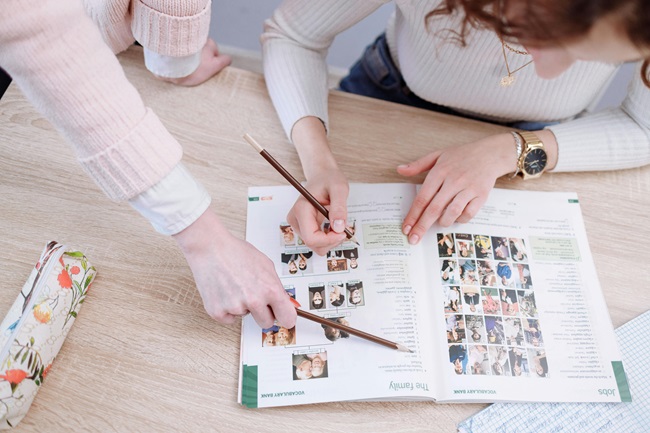
In addition to being a language professional, I also tutor students aged 14‒18 in biology, chemistry and maths. To understand what is involved, a short introduction of how the UK education system is organized may be useful.
Education for 11- to 18-year-olds in the UK
Within the UK, the education system is different for the four different nations. In England, children are in compulsory full-time education between the ages of 5 and 16, covering primary and secondary education. At the end of secondary education, students are expected to sit their General Certificate of Secondary Education (GCSE) exams in seven to ten subjects, which are graded from 9 (top grade) to 1. Anyone who has not received a grade 4 or higher for English and maths must sit the exams again. Options after the age of 16 include doing an apprenticeship and studying for vocational, technical or academic qualifications. Gaining academic qualifications requires minimum GCSE grades and an additional two years of study at ‘sixth form’ to study three Advanced Level qualifications (commonly referred to as ‘A-levels’). A-levels are graded from A* (top grade) to E (lowest pass grade). To go to university, students require A-levels or another equivalent qualification.
Universities make students an offer, which means that if they get grades A*, A or B for their three A-level subjects, for example, they can come to that university to study the course they applied for. So, the pressure is on throughout students’ time at school. In the UK, 27% of 11- to 16-year-olds say they have received private tuition at some time (Sutton Trust, Private Tuition Polling 2019). The most common reasons given for engaging a private tutor are help with general schoolwork and passing one or more exams.
Students in the UK hardly ever repeat a school year; students who start school at the same time move through the education system at the same rate, regardless of ability. Secondary education varies across regions of England, where some regions have ‘grammar schools’ in addition to ‘comprehensive schools’. Comprehensive schools do not select their intake on the basis of academic achievement or aptitude. To attend a grammar school, students must pass a test that covers verbal and non-verbal reasoning and sometimes also English and maths. This means that the pressure to perform well starts even earlier, at age 10, and because of the need to pass, many people are looking to private tutors.
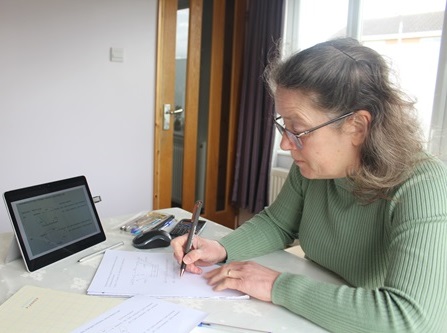 Challenges
Challenges
The county where I live (Lincolnshire) has grammar schools. Expectations are high, both by the school and by the parents. Some students come to me fairly early on (a year or two before their GCSE exams) if they are not progressing satisfactorily. In that case, it is up to the tutor to find out why, which is not as easy as it sounds if you only tutor them for one hour a week. Ideally, you’d like the student to point out what area of the curriculum they struggle with most, but they often don’t know themselves. In that case, you start with the basics – identify any gaps in their knowledge and correct misconceptions.
Other students come to me a few months before their exam when they are worried about obtaining the result required by their chosen university. In that case, reducing anxiety and stress becomes a major goal. Again, you’d like the student to tell you if there are any specific topics that we need to work on. If there is nothing specific, practising past exam papers is a good strategy to identify areas to focus on.
Since all students have different needs and learning styles, the approach to tutoring varies and every lesson will be prepared for that one student (I have up to 15 students at any one time). It is important to all students that I create an atmosphere in which they feel comfortable to ask questions they may be afraid to ask in a classroom setting. It is only when there is a good interaction between tutor and tutee that the tutoring sessions are most efficient and that most progress is made.
A further challenge for tutors in the UK is that there are as many as four examination boards with up to six different specifications per subject. Schools are free to choose whichever examination board and specification they wish to use, so a tutor can have, for example, six biology students who will each take a different exam. Tutors then must familiarize themselves with the various examination boards and acquire specific teaching materials.
Rewards
Tutoring can be rewarding. It is a means of supplementing classroom teaching in a quiet space. This is very helpful for students who are struggling to keep up with work in a noisy environment. These students often thrive in one-to-one tutoring sessions where they receive personal attention. I very much enjoy seeing their confidence grow, which generally results in improved grades.
Another rewarding aspect is finding out that your support has helped students to reach their goals, gaining entry to a course at the local college or at a university. It is rewarding to know that you helped them reach the next stage of their learning journey.
I am very interested in medicine, biology, chemistry and maths, and tutoring is a way of engaging with it most days. I try to share any new information with my students. A-level students in particular appreciate this since they often wish to study medicine or a branch of biology or chemistry at university.
Tutoring, translating and editing
The combination of tutoring and translating/editing suits me. I am a qualified teacher and as such enjoy interacting with students and knowing that I can make a difference. However, 15 contact hours a week is enough since all tutoring sessions occur late in the day after school has finished. The language work also allows me to be involved in medicine and life sciences but in a different way. I love working away quietly at long interesting projects. For me, the different roles complement each other well.
|
Blog post by: Monique Oude Luttikhuis Website: tuitionandtranslationservicesspalding.com LinkedIn: monique-oude-luttikhuis |
Written by: Hans van Bemmelen
Published: 2-04-2024
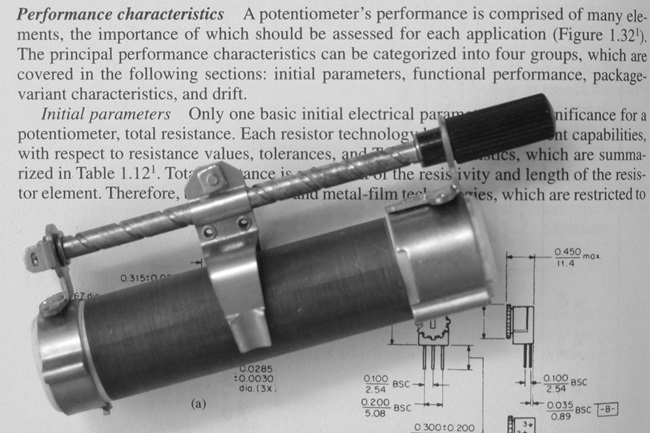
Every technical writer probably has a different idea of what the discipline amounts to. In this piece, I will describe my personal approach – undoubtedly yours will be different.
What is technical writing?
In a way, all my work is technical writing as I do not do any general writing for consumers or journalistic pieces. Quite a lot of it is on the borderline of technical writing and copywriting: press releases and articles for corporate magazines about technical products such as specialist vehicles. I would still classify that as technical writing because both the people who provide me with input (usually design engineers) and those who read my output (fleet managers, engineers, etc.) tend to have an engineering background. They (and I) have another thing in common: a dislike of marketing waffle. Purely technical recent work has included installation and operating manuals for heavy lifting equipment in power stations. Currently I am working on a long-term project to create training materials for Self-Propelled Modular Transporter (SPMT) operators. I am also assisting with a new version of the industry guideline for this equipment.
Is it any different from normal writing?
In my view, there is little difference between normal and technical writing. Both call for a thorough understanding of the subject we need to communicate and an appreciation of the intended readers. The key difference is that if you have to interview technical people to get input, it really helps to have a fairly good understanding of the subject – engineers can be rather judgmental if they think you haven't done your homework. However, once you have gained their confidence they are usually happy to tell you everything about their work, and appreciate an attentive listener. Once you have built up a good rapport, they appreciate that you are there to help get the product they have developed into the customer's factory and ensure that it is working correctly.
Research
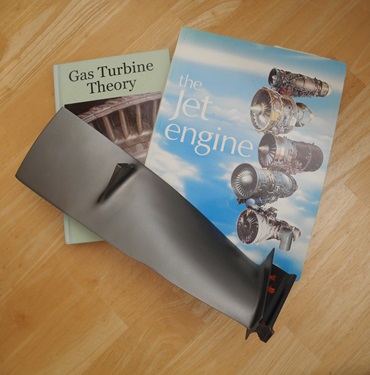 For me, doing my homework mostly means reading books to give me a good understanding of the basics of the subject, and then reading up about the latest developments on the internet. Textbooks aimed at technicians rather than engineers can be particularly informative as they often provide more technical detail than academic books. There are areas, such as heavy lifting and industrial cleaning, where few books are available. In those cases, you have to rely more on manufacturers' publications and occasionally on conference presentations. Having a good understanding of the subject helps me ask the right questions to obtain the input I need for writing the marketing materials or technical documentation.
For me, doing my homework mostly means reading books to give me a good understanding of the basics of the subject, and then reading up about the latest developments on the internet. Textbooks aimed at technicians rather than engineers can be particularly informative as they often provide more technical detail than academic books. There are areas, such as heavy lifting and industrial cleaning, where few books are available. In those cases, you have to rely more on manufacturers' publications and occasionally on conference presentations. Having a good understanding of the subject helps me ask the right questions to obtain the input I need for writing the marketing materials or technical documentation.
A few years ago I was working on some documents about gas turbines for aircraft. There was no opportunity for a site visit but I really wanted to get closer to the equipment. In the end, I managed to get a turbine blade from an online supplier, and it was really nice to literally get my hands on one of the components I was writing about.
Interviews
The aspect of my work I enjoy most is going onsite to interview engineers and technicians about their work and the products. I usually prepare for that by setting up a document with a two-column table, with my questions in the first column. On site, I then type their replies into the second column. I do record the interviews and log the sound file numbers in the second column for quick reference. However, I try to rely on my notes as reviewing the recordings tends to be quite time-consuming. Most of the time I write my notes and the replies in English, even when interviewing people in Dutch, but I realize that that would not work for everyone. A laptop is less convenient during interviews in a workshop or the yard so in that case I rely on the recording or handwritten notes.
Many years ago, I decided to invest in a proper sound recorder and microphones. I find this kit easier to work with than small consumer-grade recorders. Surprisingly, the interviewees often ask questions about it and recognize it as solid equipment – much like what they build. So that helps break the ice.
For some projects, I also take photographs or short videos. I am by no means an ace at that, but it saves briefing a photographer, and knowing what is going to be covered in the article or manual makes it easier to shoot the right subjects. However, I insist on having a short break between the interviews and photography, to give my brain time to change over and to refine the shot list.
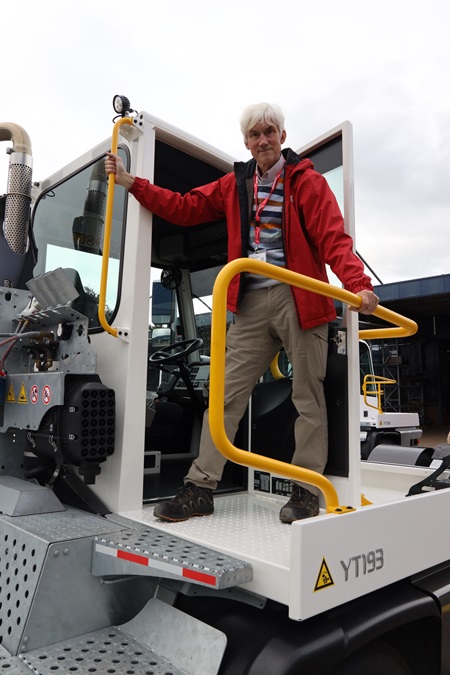 Writing
Writing
If I have done my research well and conducted the interviews effectively then the writing should be straightforward. The main issue I have come across is that sometimes the briefing, especially if done by a website or marketing agency, does not quite tie in with the content to be created. In those cases there is a need for some diplomacy (not my strongest point) when discussing how they could change the design to fit the new content.
Reviewing: bigger is better
Once I have written the first draft of an article, I send that to the client or interviewee for comments. If it is a straightforward article, then I will ask them to use Track Changes. However, not everybody is familiar with that, and it can get very confusing if there are comments from multiple reviewers. For some projects, I put all the content in the first column of a table, my queries in the second column, and then add a column for each reviewer to contribute their comments. That can give a clearer overview. Sometimes I print that table on A3 or larger paper (my plan printer goes up to A1, but Word does not like that) so we can scribble on it during an in-person meeting. Undoubtedly some will consider that a quaint, archaic approach, but it often works for my clients and me. More diplomacy is then needed to combine all the comments and incorporate them in the final document.
Been doing it for decades, still enjoying it
Having started my career as a technical translator, I slowly pivoted towards writing both marketing materials for technical products and purely technical writing. A few decades of reading the source texts for my translations has taught me quite a lot about writing, which I can now put into practice. Writing gets me more involved with projects, and has not suffered from the rate erosion in the world of translation. But translating is more straightforward and can make me feel more productive. So my writing and translating complement each other very well. After a few decades in the industry, on the whole I am still enjoying the work and getting close to a wide range of technical products and people.
|
Blog post by: Hans van Bemmelen Website: www.techtrans.eu/ LinkedIn: hans-van-bemmelen |
Written by: Paula Arellano Geoffroy
Published: 18-03-2024
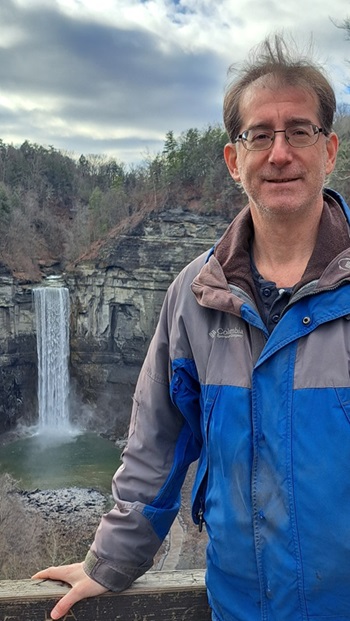
The University of York defines Special Interest Groups (SIGs) as follows: ‘A SIG is a group of people who come together around a shared interest and a passion to share knowledge and improve research and/or practice. They often cross geographical and professional boundaries and are self-managed by members of the community. Special Interest Groups can take different forms, either being more informal or more structured and either having a particular goal or focus or being more open and opportunity-driven.’
SENSE has had SIGs since its very beginning in the early 1990s. Initially, these meetings were called ‘Groups’ while the term SIG began to be used in the Society around 2015. Currently, SENSE has nine SIGs that meet regularly either online via Zoom or in person at various locales throughout the Netherlands. Each SIG has a convener (or in some cases co-conveners) who manages the meetings and chooses the topics for discussion. Meetings of SENSE SIGs are open to both members and non-members (guests).
In the following interview, I invite you to meet Curtis Barrett (on the left, standing in front of Taughannock Falls in Trumansburg, New York, near his family farm), the convener of one of our SIGs: SenseMed. Perhaps you will be tempted to join us at an upcoming meeting after reading what he has to say!
You have been a SENSE member for about a dozen years and you also happen to be our Treasurer. What would you say is the importance of SIGs for SENSE?
In my opinion, SIGs are an essential part of SENSE, as both a valuable resource for current members and a great way for prospective members to see what SENSE is all about. Quite a few members (including yours truly) came to join SENSE after attending a SIG meeting and seeing how friendly and welcoming the Society can be. While wearing my Treasurer’s hat, I’m always happy to spend SENSE’s money on SIG meetings, including invited speakers, knowing what a great investment they are.
You have a background in biomedical science. Can you tell us a bit about that and how it relates to SenseMed’s name?
My background is in biomedical research. My PhD is in neuroscience and physiology, and after my postdoctoral training I found my way to the Netherlands in 2007, where I was a group leader in genetics and neurology at Leiden University Medical Centre. So I’ve always had a sharp eye for detail and a talent for writing research articles, grants and book chapters. That’s what made my transition from bench scientist to freelance editor and teacher relatively smooth. Upon joining SENSE in 2012, I was immediately drawn to SenseMed, whose main interactions back then were via an online Yahoo! mailing list.
SenseMed was started by SENSE members Josefien Bruijn, Julie Box and Daphne Lees as a way to connect members with questions related to medical terminology. The name of the SIG comes from its focus on medical and biomedical writing, translating, editing, etc. Biomedical English is a language all its own, and we’re fortunate at SENSE to have quite a few former (and even some current) researchers and medical/healthcare practitioners, so there’s never a shortage of helpful advice.
When did you start as SenseMed convener?
Let’s see, I believe I took the reins from my predecessor, Daphne Lees, in 2018. Before then, SenseMed was almost exclusively online (first as a mailing group, then solely on our website’s members-only Forum when I first became convener), but I felt it would be nice to hold meetings so we could get to know each other IRL (‘in real life’, as my kids recently told me this means).
What are the purpose and main goals of SenseMed?
The main goal of this SIG is to share information, help each other navigate the complex world of medical and biomedical English, and even provide practical support. As freelance translators and editors, we usually work alone, so it’s great to have ‘colleagues’ to ask about terminology, what something means (the field moves lightning fast!), or what do we call a certain condition in English…
Our other goal, as I alluded to above, is to get together from time to time to share stories, provide practical tips to make the job easier (and more efficient), and maybe even commiserate about ‘that incredibly long and complicated research paper I’m editing’.
Can you walk us through the last SenseMed meeting? What were the main discussions about?
Our last meeting was held in January of 2023 and was a ‘Mind vs. Machine editing slam’. During this online meeting, we looked at how well an AI-based editing tool – Writefull – performed against a professional editor (spoiler alert: not so good!). I provided everyone with a short excerpt from a research article I had edited, and we compared the edits with Writefull’s in real time. The meeting was quite well attended, and prompted a lively discussion.
Are you an avid reader? Can you recommend some books?
I was afraid you might ask this! I’m embarrassed to say I’m not much of a reader, but I do enjoy picking up the latest John Grisham book whenever I’m at the airport for an easy read.
|
Blog post by: Paula Arellano Geoffroy Website: paulaarellanogeoffroy.com LinkedIn: paula-arellano-geoffroy |
Written by: Susan Jenkins
Published: 4-03-2024

Since the introduction of ChatGPT and exponential growth in generative artificial intelligence (AI) applications, I’ve been sampling their capacities for accelerating my writing and editing processes.
I wear multiple hats as a word wrangler, switching between academic audiences, students, and culture seekers. Having tools that can leverage AI language models to expedite tasks from transcript processing to style revision would be welcome, especially if they are all part of the same toolbox. With Draftsmith, this wish comes closer to reality.
Draftsmith is a new add-in for Microsoft Word by the developers at Intelligent Editing, whose proofreading software PerfectIt is well known by SENSE members. Intended as an all-in-one toolbox to help writers move from a rough draft to a finished one, it has many features that editors can also use to quickly improve readability or style.
The Draftsmith environment
Draftsmith is essentially an interface that operates complex natural language prompts on the back end. These prompts communicate with Microsoft Azure’s OpenAI Service, which relies on the large language model (LLM) behind ChatGPT. This also means that you need an internet connection to use Draftsmith.
The Draftsmith environment loads in Word (see the ribbon in MS Word Online below), which allows you to edit documents directly. Clicking on any of the icons in the ribbon of your Word document launches the side panel where the editing suggestions appear. At the top are three customizable buttons that apply different tools, called ‘suggesters’.
 Clicking any one of the buttons applies that suggester to the first sentence in your text, and a revised suggestion appears in the window below.
Clicking any one of the buttons applies that suggester to the first sentence in your text, and a revised suggestion appears in the window below.
For those who want to customize their work session, it’s possible to change the suggesters by selecting the down-arrow tab under the button (see the image below, on the left). A menu appears (image below, on the right) with suggesters grouped under the categories Audience, Style, Line Edit, Multilingual, or Funny (which offers Talk like a Pirate Day and other fun options to spice up a text). Note that these categories differ from those in the ribbon, which may be somewhat confusing when first learning to navigate Draftsmith’s interface.
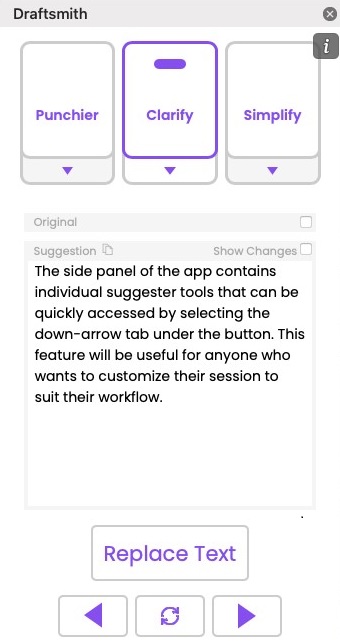
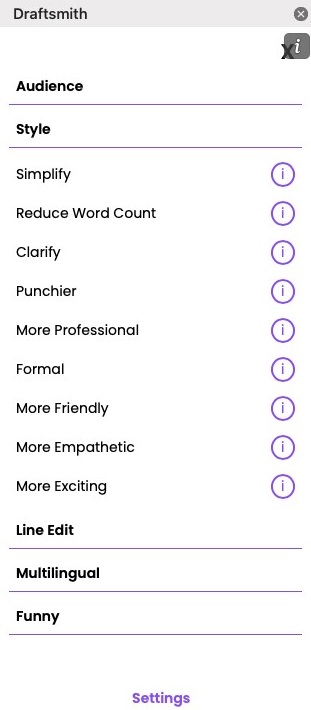
Proceeding sentence by sentence through a text using arrows at the bottom of the side panel, you have full control over accepting suggested changes. You can use Word’s Track Changes – just set it to ‘Simple Markup’ to reduce visual clutter while making a pass with Draftsmith.
How Draftsmith worked on a variety of sample texts
I put Draftsmith through its paces on passages from a range of assignments at pre-editing, revising and final draft stages. The main learning curve was in selecting the right suggesters for a text, but once I consulted Draftsmith’s online help files I understood better what to try in different situations.
Tools for the pre-editing stage: Dictation Fixer and Fluency Enhancer
- Dictation Fixer
I often write articles based on interviews with people. The automated transcripts of online meeting apps are typically unusable until you clean up time stamps and correct broken sentences. Compared with manually cleaning, Draftsmith’s Remove Typos and Polish suggesters can speed up this process. However, it can handle only a small amount of text at a time, while most transcripts of more than 15 minutes are in the thousands of words. For this task, it doesn’t work as well or as quickly as other apps I’ve used. Hopefully this will improve in future releases.
- Fluency Enhancer
Clicking on Fluency Enhancer loads the suggesters Simplify, Improve English and Translate to English in the side panel. Intended to improve texts written by non-native speakers of English, I found the results quite satisfying. I tested Simplify and Improve English on two research papers from academic writing students with very different challenges. One writes with a lot of poetic flourishes and tends to use linking words at the beginning of every sentence, while the other has a limited vocabulary and often uses informal language.
In the first case, I applied the Improve English suggester to three sentences (about 75 words) at a time. Draftsmith made the writing clearer, took out the extraneous linking words, and changed others to more appropriate ones, enhancing the writer’s strengths with vocabulary and overall structure. When I applied Simplify to the same text, these lovelier attributes were removed, and the text was dulled by a lack of rhetorical flavour.
In the case of the writer with short, informal sentences, Improve English melted away the awkwardness in their text and raised the level of sentence structure to where the ideas came forward and the piece read easily.
I could see using the Improve English suggester as a first pass for improving a scholarly manuscript from a non-native English writer in science, social sciences or business.
Tools for revising: Engagement
Using AI to tune for engagement is tricky – you can easily lose the spark of an individual writer’s voice or introduce hyperbole in the place where gentle enthusiasm is intended. When copy-editing English articles for a local Japanese cultural organization, I often need to improve the tone of voice for better engagement.
For a sluggish introduction, I first tried the Clarify suggester. The result was okay, but still a bit stiff. The Punchier suggester (see example below) returned something closer to what I wanted without overdoing the enthusiasm, and was easy to tweak. If I were reworking a longer text, this could help me quickly transform it to the point where I would only need a final check before publishing.
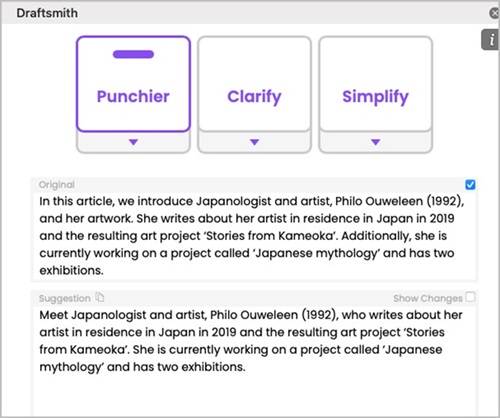 In other revising options, it’s worth mentioning the Simplify group of suggesters, which can help untangle jargony sentences for different audiences. Four are designed to convert a text to meet various reading levels from age seven (2nd grade) to college, while two others align a text with either plain English or simplified English.
In other revising options, it’s worth mentioning the Simplify group of suggesters, which can help untangle jargony sentences for different audiences. Four are designed to convert a text to meet various reading levels from age seven (2nd grade) to college, while two others align a text with either plain English or simplified English.
Tools for the final draft: Redraft
An annual report for the same cultural organization had similar issues with long sentences and some heavy adjective use. After I applied the Redraft suggester, it corrected odd linking words and reworked awkward phrasing.
An early draft of an article I wrote for a scholarly news website benefitted from Redraft as well. My first drafts usually contain long dense sentences that need simplifying without changing terms or tone of voice. Redraft flattened the flair a bit, yet was still helpful because it sparked the clarity I needed to make a more appropriate edit, as you can see below.
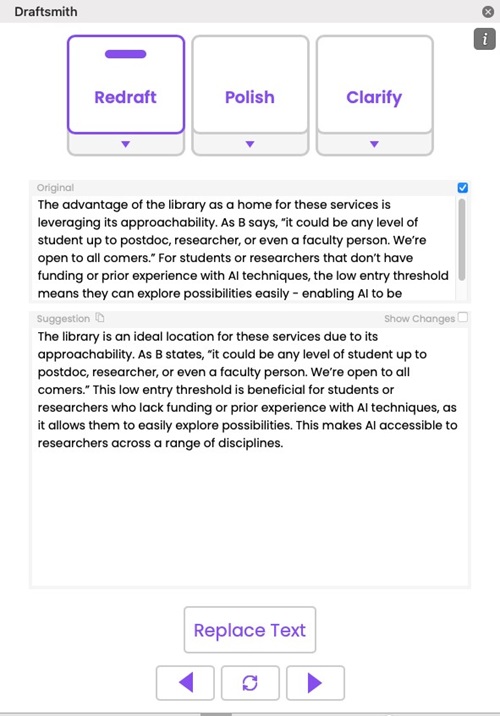 Because this suggester changes words and sentences, it’s important to double-check quoted text when using it.
Because this suggester changes words and sentences, it’s important to double-check quoted text when using it.
Tips for getting the most out of Draftsmith
- Select multiple sentences
Results were often better when I selected two or three sentences to process at a time instead of one. When processing only one sentence, the suggester sometimes used inconsistent pronouns or showed other contextual blind spots. According to the support materials, Draftsmith can process up to 400 words at a time. Redraft seemed unable to process more than 75 words (four sentences) at once, but simpler suggesters such as Polish, which don’t change sentence structure, can do more.
When I asked about possibly increasing the amount of text Draftsmith can handle, their representative told me they are exploring ways to make paragraphs the unit of analysis, while still processing at the sentence-level, which provides certain advantages.
- Use the refresh button for ideation
If you don’t like a suggestion, the refresh button re-processes the snippet and generates a new one. When tuning for Engagement, I found five or six refreshes provided a few workable options, which allowed me to quickly hone in on what I wanted. Note that you can’t retrieve a previous suggestion after refreshing – so if you see one you might use, copy it to return to later if desired.
Taking data privacy seriously
When applying Draftsmith tools, your text is sent to their servers for processing. Privacy in transmission is protected with an encrypted application programming interface or API. Also, your submitted text is neither stored on any server nor used for reinforcement training of LLMs. The Draftsmith website offers a detailed illustration of how the security model works.
A partner, not a replacement
Affirming the feeling that long-time users of PerfectIt may recognize, Draftsmith reflects Intelligent Editing’s approach to technology as a support for human mastery and not the other way around. I appreciate their humbler, customer-first approach that is often lacking in the tech world’s headline-makers.
A Draftsmith suggestion is just that: you can refresh, refine, skip it altogether, or use it, as I often did, to clarify my thinking process. In this way, Draftsmith reinforces the discussions about AI technology in the language industry – as an evolving human-machine interaction where you converse with an AI helpmate. If you’re a fluid writer, Draftsmith probably won’t be particularly helpful, but as a second pair of eyes it can clear a few obstacles to faster editing. Furthermore, Draftsmith may also help more editors and writers learn to harness the power of LLMs for enhancing – not replacing – the unique and essential work they already do. I’m looking forward to experimenting more with these tools and building that expertise.
|
Blog post by: Susan Jenkins Website: www.stjenkins.com LinkedIn: susantylerjenkins-connect |
Published: 20-02-2024

|
Blog post by: Nancy du Plessis Website: www.everything-in-english.com About Nancy: www.nancyduplessis.com |
Written by: Anne Hodgkinson
Published: 8-02-2024
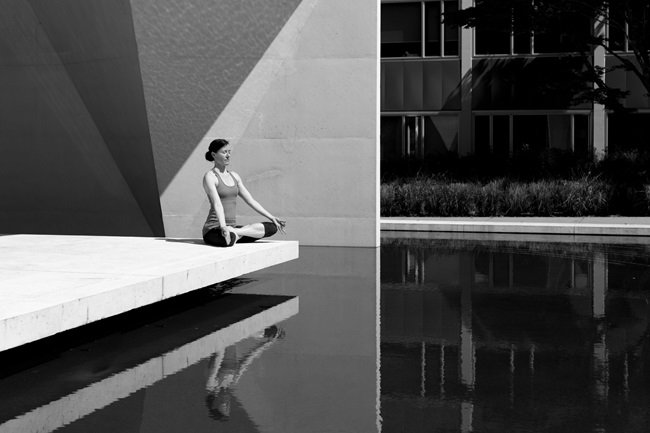
Some of you may have caught my ‘Yoga while you work’ session at last year’s Professional Development Day (PDD) and know that I’ve been teaching yoga for a while now. I’d like to share a little more of my experience, as well as some more information than would fit in the half-hour session we had that day.
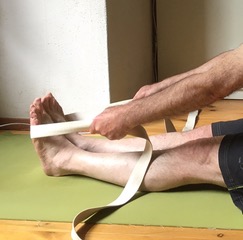 I came to yoga relatively late in life. After trying out several kinds of yoga (there is a bewildering array of them out there), I settled on Iyengar Yoga, named after Mr BKS Iyengar, one of a handful of people who brought yoga from India to the West in the second half of the 20th century. (He famously said, ‘Call it Iyengar yoga if you want to, I just call it “yoga”.’) In it, poses are generally held for longer and there is more focus on alignment than in most other forms. Iyengar also pioneered the use of ‘props’ such as blocks and belts, which help people feel the intention behind the poses. This is especially helpful for beginners.
I came to yoga relatively late in life. After trying out several kinds of yoga (there is a bewildering array of them out there), I settled on Iyengar Yoga, named after Mr BKS Iyengar, one of a handful of people who brought yoga from India to the West in the second half of the 20th century. (He famously said, ‘Call it Iyengar yoga if you want to, I just call it “yoga”.’) In it, poses are generally held for longer and there is more focus on alignment than in most other forms. Iyengar also pioneered the use of ‘props’ such as blocks and belts, which help people feel the intention behind the poses. This is especially helpful for beginners.
What is yoga?
Briefly, ‘yoga’ is a Sanskrit word meaning ‘union’, from which the English word ‘yoke’ is derived. Originally, yoga was pure meditation, practised to achieve union with the divine. Since devotees needed to be able to sit for hours at a stretch, a system of exercises was developed to strengthen and prepare the body for it. Today, there are many forms of yoga practised all over the world, ranging from pure meditation or service (e.g. working in an ashram) to athletic ‘flow’ and ‘power’ yoga.
Many schools of yoga, including Iyengar, draw inspiration from the ‘Yoga Sutras’, written by a sage named Patanjali sometime between 200 BCE and 200 CE. It begins more or less with the sentence ‘Yoga is the stilling of the fluctuations of the mind’. It goes on to describe how to do that, starting with precepts on how to act towards others and yourself, and on through breathing exercises, poses and meditation. Ultimately, one is freed from the encumbrances that the past and future can put on us; this is not done by ignoring them, but by recognizing when they’re in the way – then we can let go of them.
Because most yoga practised in the West focuses on the physical, most people seem to think it’s reserved for the bendy. (If I had a nickel for every time I’d heard ‘I could never do yoga, I’m too stiff!’…) In fact, yoga gets rid of stiffness. It can also make you stronger and the breathing, as well as poses like twists, allows better circulation to your abdominal organs.
I experienced all of the above benefits doing yoga. In learning to respect and acknowledge my boundaries, I also learnt that some of them could be stretched. While accepting other limitations, I also came to appreciate what our bodies do for us every day, in addition to transporting our brains to conferences, as someone once said. And – quite unexpectedly – I started to feel much calmer after a good session (I tend to be a little high-strung) and, occasionally, I can find that calm at off-the-mat moments as well. I’m not saying I’ve attained enlightenment by any means, but for me yoga really did and does ‘still the fluctuations’ of my mind.
If you feel that yoga is out of reach for you because of all the slick photos of people tied in knots in studio ads and Instagram posts, I’d like to say that the photo is a guide. Many people enjoy yoga without ever getting into the ‘final’ version of a pose. The beauty of yoga is that, unlike say, tennis, any effort towards that pose that entails some challenge for you is yoga. There are classes done sitting on/in chairs, even in wheelchairs. With a good teacher encouraging us, focusing awareness on the body compels us to stay in the present moment. Should that sound too ‘Land of Woo’, be assured that it’s very concrete. In fact it means that for an hour or so, we don’t get caught up in fantasizing about the future (e.g. to-do lists) or ruminating about the past (e.g. ‘that’s what I should’ve said…’), and it feels refreshing.
Yoga practice affects my work in that the body awareness helps me realize I’m sitting badly or need a break, before something starts to hurt. I also sometimes become aware of the old fluctuations acting up and decide it’s time to clear my head, or I notice I’ve been holding my breath for some indeterminate period.
I was so in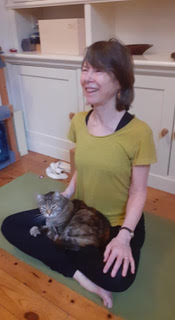 spired by what yoga did for me that I eventually decided to teach (photograph on the left: during one of the lighter moments of the pandemic, teaching online). It wasn’t until I was teaching yoga that I realized what a good complement it is to my desk job. Not only does it get me out and get me moving, but I also have contact with other people, in person. (We got through Covid by going online and we got creative with using furniture, doors, books and many other objects as our props.)
spired by what yoga did for me that I eventually decided to teach (photograph on the left: during one of the lighter moments of the pandemic, teaching online). It wasn’t until I was teaching yoga that I realized what a good complement it is to my desk job. Not only does it get me out and get me moving, but I also have contact with other people, in person. (We got through Covid by going online and we got creative with using furniture, doors, books and many other objects as our props.)
Work comes into yoga when I realize how important language can be in teaching and that, for some people, words are not as good as visual cues or hands-on adjustments.
Once I started teaching, I felt a clear parallel with the idea of keeping your target reader in mind. As Stephen Johnson put it at the same PDD in his ‘How to write great copy’ workshop, the first question many of us ask when taking on a job is ‘who is going to be reading this?’. In my first teacher training, we practised teaching each other. There were twenty of us, relatively fit and young, and the yoga style was Vinyasa, the flowy kind. When I started to teach my own classes, I quickly realized that many of my students were older, stiffer and were dealing with some injury, and some students were male, and they simply couldn’t do all I was asking. Nothing makes someone abandon a class quicker than the feeling they’ll never get it. I had to tone it down for my ‘audience’ and think about what I could do to enable students to get the most out of the poses. The Iyengar training was much better in this respect. Starting from what the student can already do is more challenging than just reciting instructions and hoping people can imitate you, but it makes them feel good instead of inadequate and the connection makes it much more rewarding for both parties. I’m much more present myself because I’m observing them.
For me, yoga is a wonderful complement to my sedentary life as a translator and editor, and teaching is an antidote to the solitude. One last benefit: I don’t believe yoga will keep me young, but I do believe it’s helping me stay healthy as I get older. If you’re curious, look around – most teachers/studios offer a free or cheap trial class and many offer a short introductory course for beginners. I’m sure there is a form you’ll enjoy.
|
Blog post by: Anne Hodgkinson Website: www.rosettastonetranslations.nl/ Blog: www.bootsandbowtie.com/ |
Written by: Jenny Zonneveld
Published: 23-01-2024

SENSE members met under the Zuid-Holland SIG umbrella at Joanna Bouma’s house in The Hague on 16 November 2023. While we enjoyed Joanna’s drinks and snacks, we had a lively discussion about the merits of machine translation.
Some of us have clients who use DeepL as a matter of course, and then send the text to an editor or translator for correction. We agreed it is essential to have the original source text for these tasks, so you can refer to it when checking a translation. Then you can spot where the human translator or machine translation has plugged in the ‘necessary variation’ – which refers to machine translation’s penchant for inserting synonyms when consistent terminology is required.
DeepL shortcomings
SENSE member Marilyn Hedges has significant experience of post-editing DeepL translations and shared her observations and some of the issues she and a colleague have identified. These include the following:
- Inconsistent terminology between adjacent sentences.
- Inconsistent use of quotation marks.
- Poor translation of the more creative source texts; DeepL appears to perform better with factual documents.
- DeepL is not very good with headings, especially those with clever alliteration, and the same goes for less well-known idiomatic expressions.
- DeepL gets easily confused if the source text contains any typing errors.
DeepL Pro
DeepL Pro, the paid version of DeepL, offers some extra features. You can upload glossaries and access the editing tool known as DeepL Write. Also, in the translation and editing windows there’s an option to listen to both the source text and the translated or edited texts.
Tips and tricks
There are other useful features in the browser version and DeepL for Windows app, which you can invoke using the keyboard shortcut Ctrl+C+C:
- Access dictionary entries for the source text by simply clicking on a word.
- See alternatives and synonyms in the target text. When you select an alternative, DeepL rewrites the sentence using your selection and will also offer to add this to the glossary.
Mysteries of DeepL
It is unclear whether DeepL translates sentence by sentence or looks at larger sections of text. I have experimented and observed varying results from the different ways of using DeepL:
- In a browser, copy and paste a single word, sentence or longer chunk of text.
- In the app, copy and paste a single word, sentence or longer chunk of text.
- In a translation tool such as MemoQ, Trados, and Déjà Vu.
- Translating an entire document, either in the browser or desktop app version.
Optimizing workflows
We talked about different workflows for incorporating or avoiding machine translation in our work and how this affects our consistency and creativity. We discussed how best to help clients who send a machine-translated document for post-editing. Depending on the nature and quality of the source text and its intended use, it may be quicker and cheaper for the client to start the translation from scratch. We can explain why this is the better option as clients may not be aware of the shortcomings of machine translation and why it makes mistakes.
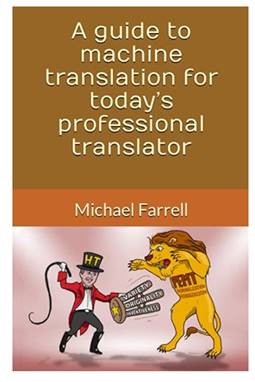
Types of errors in automated translations
Machine translation expert Michael Farrell gives a good explanation of errors in his book ‘A guide to machine translation for today’s professional translator’. He lists these errors as lexical errors, syntactic errors, grammar errors, errors due to lack of cultural knowledge, stylistic errors, human errors (in the source text) and technical errors.
ChatGPT
The next topic we discussed was the use of ChatGPT as a translation tool and the reasons why the AI text generator is prone to ‘hallucination’. Simply explained, this is because the algorithm for selecting the next most common word or phrase in the sequence contains a randomizer, which sends it off on a tangent. This is similar to machine translation engines inserting the ‘necessary variation’ mentioned above.
Next meeting
At the next Zuid-Holland SIG meeting, on Monday 29 January 2024, we will discuss AI, editing and copywriting. Do join us if you can. Dogs are welcome!
|
Blog post by: Jenny Zonneveld Website: www.translatext.nl LinkedIn: jennyzonneveld |
Written by: Kees Kranendonk
Published: 16-01-2024
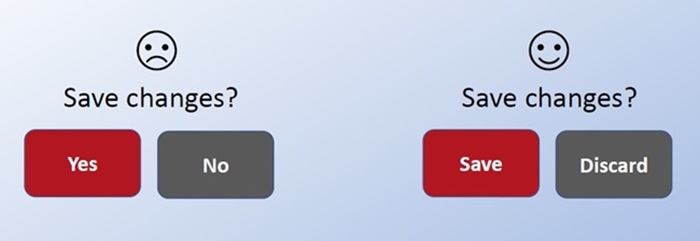
Microcopy. Not a word that rocks the headlines every day – and you’d be forgiven for thinking that SENSE’s 22 November 2023 webinar was going to focus on small print. You know, that legal abracadabra that many of us are all too happy to ignore. As it turned out, the evening centred on those tiny texts we all need and read, but as translators and copywriters, perhaps don’t always give enough thought.
Some 30 attendees had responded to Utrecht SIG convener Jenny Zonneveld’s invitation to hear a talk by Elina IIaria Nocera, Italian-English marketing translator, web copywriter and microcopy expert.
Under the banner ‘Microcopy: snippets of text have a huge impact’, Elina shared her wisdom on the importance of those small messages that help us navigate the internet and complete our online actions correctly. Also known as UX text – where UX is short for User eXperience – you find microcopy on buttons, tooltips, placeholders, confirmation messages and more.
The purpose of microcopy is to motivate and guide the user, and to give feedback on the actions performed. Since these are primarily functional messages, they used to be quite formal, up to the point of being robotic. And while even today many still are, Elina taught us that they are also well-suited for building and cementing a brand’s identity.
Microcopy, then, should be transcreated. The snippets offer a unique opportunity for a brand to forge relationships and build trust with existing and potential customers, while using its own, consistent voice. Indeed, it is a missed opportunity for any brand to not view UX text as marketing copy. It should be written and/or translated correspondingly, adapting the message to the audience.
Elina treated us to an avalanche of examples good and bad (the three images in this blog post are from her presentation, including the ones below from Asos and Mailchimp), along with advice on dos and don’ts. For example, did you know that confirmshaming* is not a good idea? That you don’t want to use these manipulinks*? And yes, for this type of content, clear and concise beats clever and snappy anytime. Good microcopy is human, polite and conversational. It is crystal clear, brief – but not telegraphic – inclusive, and consistent in wording and voice.
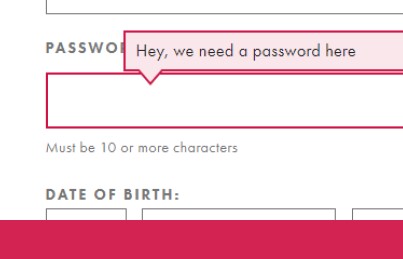
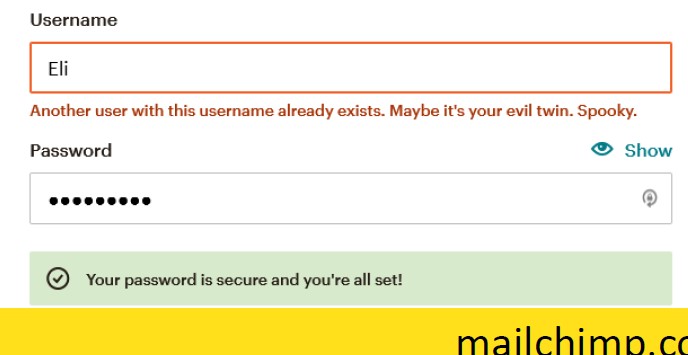
With a busy Zoom chat box running simultaneously, Elina guided us through the topic in a very pleasant and professional way, sharing insights and confirming her position as a microcopy expert. She offered ample room for participation and feedback, and a lively conversation followed afterwards. I have no doubt that, going forward, those who attended will give a lot more thought to these tiny texts, in the knowledge that they are just as important as the landing page.
*Confirmshaming: Guilting the user into something by wording the option to decline in such a way that it induces a feeling of shame or embarrassment. ‘No thanks, I’ll give that advantage to the competition.’ The actual link is called the manipulink.
|
This informative webinar/SIG meeting was accessible to members and non-members alike. In fact, many SENSE events are. Of course, there are many benefits to being a SENSE member, so you should definitely consider it! You can keep up with SENSE by following us on LinkedIn. |
|
Blog post by: Kees Kranendonk Website: keeskranendonk.com/en/ LinkedIn: keeskranendonk |










